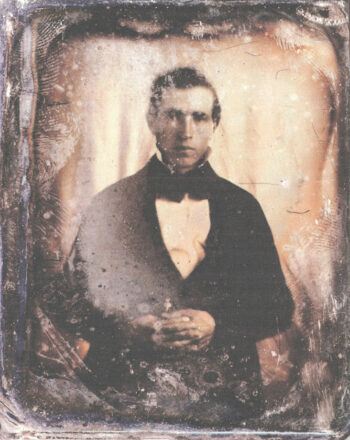By Mark Ellis –

The ongoing feud between Sen. Mitt Romney and President Trump goes back to the 2016 presidential campaign and has waxed and waned ever since. Most recently, it has erupted at a fever pitch, leaving at least a few to wonder if Romney is consciously or subconsciously fulfilling a prophecy uttered by Joseph Smith in 1843.
“Our great-grandfathers were friends and bonded over the fact they were both arrested for polygamy at the same time, in 1884,” writes Judith Freeman in the L.A. Times. While Freeman left the LDS Church, she has vivid memories growing up in a Mormon household in the 1950s.
Her great-grandfather, William Flake, lent Romney’s ancestor $1000 to post bail related to the polygamy charge, but was never repaid. Instead, Miles Romney fled to Mexico with his wives and children.

Freeman’s other connection with Romney relates to an unusual prophecy she heard as a youngster. “It’s something every child growing up in a Mormon household in the 1950s had drilled into their heads,” she notes.
“One day,” we were told, “the Constitution of the United States will hang by a thread and a Mormon, or group of Mormons, will save the nation.”
The founding prophet of the church, Joseph Smith, made the so-called “White Horse Prophecy” in 1843. To lend drama to the pronouncement, he uttered the words while standing in front of a copy of the apocalyptic painting, “Death on a Pale Horse,” by the artist Benjamin West.
Today, the LDS church distances itself from the prophecy, but for years it was repeated by bishops, prophets and leading Mormon politicians such as Orrin Hatch, according to Freeman.
“Mitt Romney’s father, George, said in 1967, when he was a U.S. presidential candidate, that ‘the question of whether we are going to proceed on the basis of the Constitution would arise and at this point government leaders who were Mormons would be involved in answering the question.’”
Prominent Mormons believed that one day the U.S. Constitution, “revered by Mormons as a document inspired by God, would become so deeply endangered and torn asunder that it would also tear the nation apart, and it would be up to Mormons in powerful positions to save us.”
With the country bitterly divided and an impeachment looming, Freeman thinks we are at an “extremely dangerous moment” in the nation’s history.
She also contends that Romney must have this prophecy on his mind. “I don’t see how he could help it,” she writes. “The White Horse Prophecy is not the sort of thing you forget, even if, like me, you have long since left the faith. Romney, after all, is the most recognized Mormon on the planet, who also happens to hold a seat in the U.S. Senate where an impeachment trial would be held, a position of power foretold.”
Freeman wonders if Romney will go along with the Republican establishment or “stand up for the Constitution and urge his fellow Republican senators to do the same?” revealing her political bias in the matter.
She notes that in 2007 Romney was asked about the White Horse Prophecy and he said, “I haven’t heard my name associated with anything of that nature. I don’t put it at the heart of my religious beliefs.”
Freeman believes Romney was downplaying his Mormon connection at that point. But there was probably no other public response he could make. Any other reply would have appeared to be messianic.
In her article, Freeman practically begs Romney to lead the Republican side in impeaching President Trump. “This could be his moment to step forward, as his father suggested, to answer that question of whether we are going to proceed on the basis of the Constitution.”
She is also willing to forgive the $1,000 debt owed to her great-grandfather if Romney leads the opposition. “I, as one lone Flake descendant (out of so many out there), would consider the debt forever repaid if Mitt would fulfill the prophecy and put the country and the Constitution before all else.”
Many Christians will ask if Joseph Smith was a true prophet of God. Two months before

(Wikimedia Commons)
Smith was killed by a mob in 1844, he preached the following sermon:
“God was once as we are now, an exalted man, and sits enthroned in yonder heavens. I say if you were to see him today you would see him like a man in form like yourselves and all the person and image of a man. I am going to tell you how God came to be God. We have imagined that God was God from all eternity. I will refute that idea and take away the veil. God was once a man like us and dwelt on an earth, the same as Jesus Christ did, and you have got to learn to be gods yourselves the same as all gods before you. Namely by going from one small degree to another, from a small capacity to a greater one.”
In the book, Fast Facts on False Teachings, authors Ron Carlson and Ed Decker note that of the 65-70 prophecies of Joseph Smith recorded by the church, only five or six came true.
As the Bible records: “A prophet who presumes to speak in my name anything I have not commanded him to say, or a prophet who speaks in the names of other gods, must be put to death. You may say to yourselves, ‘How can we know when a message has not been spoken by the Lord?’ If what a prophet proclaims in the name of the Lord does not take place or come true, that is a message the Lord has not spoken. That prophet has spoken presumptively. Do not be afraid of him.” (Deuteronomy 18:20-22)
Judith Freeman is the author, most recently, of “The Latter Days,” a memoir.




I was pretty sure that the White Horse prophesy was in Romney’s mind when he ran for president the first time and also wonder if it was the cause for Glen Beck’s ongoing disparagement of Trump in the last election and beyond. But I find it hilarious that someone would call for Trump’s impeachment over the Constitution when it is clearly the Democrats who would tear it down or re-define it as needed to fit their own purposes. I guess “hilarious” is the wrong word. “Sad” might be better. As Isaiah records: “Woe to those who call evil good and good evil, who put darkness for light and light for darkness, who put bitter for sweet and sweet for bitter! “
Comments are closed.